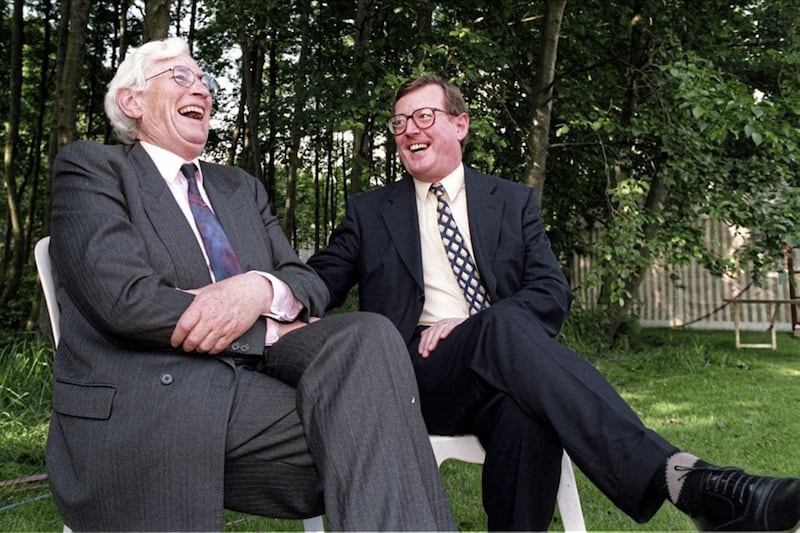On September 2 1994, just two days after the IRA announced its “complete cessation of military operations”, a poll in the Belfast Telegraph indicated that 56% of people in Northern Ireland believed that the ceasefire had come about as a result of a secret deal between the British government and the IRA.
On September 6, a DUP delegation led by Ian Paisley was thrown out of John Major’s office in Downing Street because they refused to believe the prime minister’s assurance that no such deal had been done.
The same poll also indicated that just 30% believed that the ceasefire was permanent; an indication, perhaps, that even a significant element of nationalism and republicanism reckoned the circumstances required for permanency were unlikely to emerge anytime soon. That reckoning seemed to be confirmed on October 23 — 10 days after the Combined Loyalist Military Command had announced its own ceasefire — when Martin McGuinness stated that IRA violence could resume if a satisfactory outcome was not produced by a new peace process.
Eighteen months later, on February 9 1996, that’s exactly what happened. Shortly before 7pm an IRA statement ended the ceasefire: and at 7.01pm a massive bomb exploded at Canary Wharf in London, killing two men, injuring more than 100 people and causing damage worth upwards of £100 million.
That might have been expected to grind the entire peace process to a halt, yet the election to the NI Forum/Entry to negotiations elections on May 30 saw Sinn Féin rise to 15.5% (its highest share since it began contesting NI elections after 1981), just 3% and four seats behind the SDLP.
There had been a pre-election hope in some unionist circles that SF would do badly in the elections and find themselves increasingly isolated after the high hopes of the British, Irish and US governments in August 1994. But SF was pleased with the outcome and clearly determined to remain in whatever peace process followed — even though the IRA had immediately ruled out any renewed ceasefire before scheduled all-party talks on June 10; and further refused any form of decommissioning until SF had agreed an overall political settlement.
It was to be September 1997 before negotiations got properly underway. By that time, though, both the DUP and UKUP had left the process over SF’s involvement; meaning that the UUP/PUP/UDP (34 seats and 30% of vote) were inside, while the DUP/UKUP (27 seats and 22.4%) were outside and campaigning against David Trimble and against the loyalist paramilitary parties.
It was a weak position for unionism inside the room to find itself: and, on reflection, a much weaker position than that which Brian Faulkner found himself in during the Sunningdale negotiations in December 1973.
The Good Friday Agreement wrecked the UUP internally. Ironically, most of the wrecking was done by the DUP, which then propped up the very structures which it had opposed from 1997-2007 before, itself falling apart
In early 1999, a year after the Good Friday Agreement was endorsed in the referendum, Trimble’s predecessor, Jim Molyneaux, suggested that the August 1994 ceasefire was, “the most destabilising event since partition (and) the worst thing that has ever happened to us”. By “us” he meant unionism generally. I think he had already accepted that the direction of travel of the mostly bi-partisan British government policy since 1972 would end with SF involvement in any deal, but was still shocked by the scale of ‘damage’ done to unionism.
In fairness, he did have a point. The GFA wrecked the UUP internally. Ironically, most of the wrecking was done by the DUP, which then propped up the very structures which it had opposed from 1997-2007 before, itself falling apart and ending up on the wrong side of Conservative governments during the post-Brexit negotiations. A new ‘alliance of interests’ embracing the TUV, Reform UK and elements of new-generation loyalism has now emerged which, I presume, will devote itself to undoing the work of Trimble and the DUP. Hmm.
I’m not for a moment suggesting that there was any sort of unified coherence across unionism before September 1997, but it does strike me that unionism — in all of its manifestations — is more muddled and fractious now than at any time since the 1972-79 period. Indeed, I would argue that it is probably in a far worse state today than at any time since the first Home Rule Bill in 1886. It survived and outlived those Home Rule crises and then survived the collapse of the NI Parliament in 1972.
But what does it do now? How does it survive, let alone outlive, the greatest crisis in its history — transformed into an electoral minority in Westminster, the Assembly and local councils, and with assorted demographic factors and evidence indicating ongoing and incoming problems and challenges?









